On October 25, 2022, the IRS released draft 2022 partnership instructions for Form 1065 Schedules K-2 and K-3 that, among other changes, include a new exception to filing and furnishing to partners Schedules K-2 and K-3 for 2022.
Introduced beginning with the 2021 tax year, Schedule K-2 (Partners’ Distributive Share Items—International) and Schedule K-3 (Partner’s Share of Income, Deductions, Credits, etc.—International) replaced and supplemented reporting previously completed on Schedules K and K-1. The new schedules are used to report and furnish partners with certain information in connection with reporting requirements relating to international tax provisions.
The draft instructions for the 2022 tax year has a “domestic filing exception." Under the exception, a domestic partnership does not need to complete and file Schedules K-2 and K-3, nor furnish Schedule K-3 to a partner (except as specified) if the partnership meets four criteria for the tax year:
- No or limited foreign activity. The domestic partnership must have either no “foreign activity” during the tax year or its foreign activity must meet certain specified limitations (i.e., be passive income, with no more than $300 of foreign income taxes allowable as a credit under Section 901 treated as paid or accrued by the partnership, and the foreign income and taxes are shown on a payee statement that is furnished to the partnership). For this purpose, “foreign activity” includes foreign income taxes paid or accrued, foreign-source income or loss, and ownership interests in foreign partnerships, corporations, branches, or disregarded entities.
- U.S. citizen/resident alien partners. All direct partners in the domestic partnership during the tax year must be U.S. citizen individuals, resident alien individuals, or – if their beneficiaries are solely U.S. citizen or resident alien individual beneficiaries – domestic decedent’s estates, grantor trusts, or non-grantor trusts.
- Partner notification. Partnerships satisfying the first two criteria must further notify their partners that they will not receive Schedule K-3 unless requested. The notification must be made electronically or by mail no later than two months before the due date (without extension) for filing the partnership’s Form 1065 for the tax year. For 2022 calendar year partnerships, the notice must be sent on or before January 15, 2023.
- No 2022 Schedules K-3 requests by the ‘one-month date.’ The partnership must not receive a request from any partner for Schedule K-3 information on or before the date that is one month before the due date (without extension) of the partnership’s Form 1065, “the one-month date” (i.e., for calendar year 2022 partnerships, February 15, 2023). The partnership must still provide a requested Schedule K-3 to partners making such requests after the one-month date, but such requests will not cause the partnership to fail to meet the domestic filing exception.
If a partnership fails to meet the domestic filing exception solely due to the fourth criterion (i.e., a partner making a Schedule K-3 information request before the one-month date), the partnership must complete and file Schedules K-2 and K-3 but only with respect to the parts and sections relevant to the requesting partner.
Next steps
The IRS added the domestic filing exception in response to input from stakeholders. It should come as welcome news to partnerships meeting the criteria that they will be able to avoid additional reporting burdens that are not relevant to their activities.
The partnership instructions for the 2022 Schedules K-2 and K-3 are still only in draft form and could be subject to change before finalization. The IRS is accepting comments on the draft instructions until November 8, 2022.

.png)




